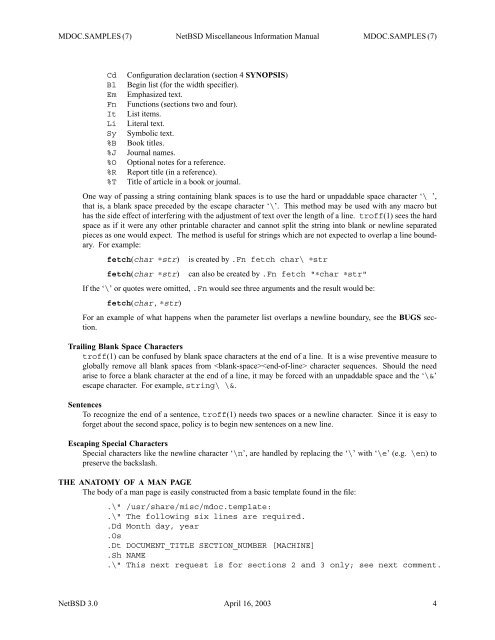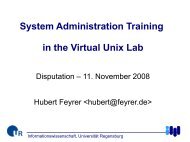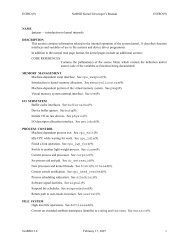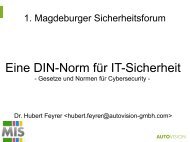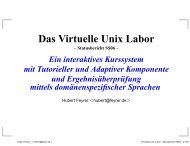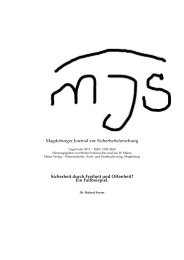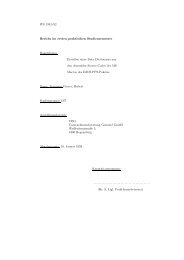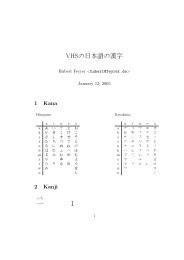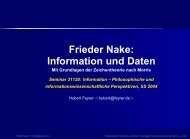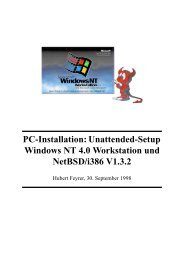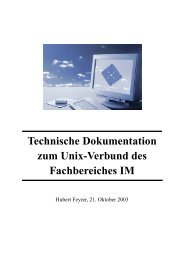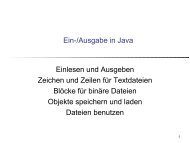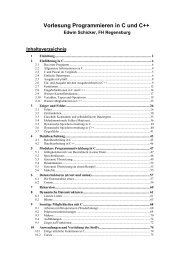INTRO (7) NetBSD Miscellaneous Information Manual INTRO (7 ...
INTRO (7) NetBSD Miscellaneous Information Manual INTRO (7 ...
INTRO (7) NetBSD Miscellaneous Information Manual INTRO (7 ...
You also want an ePaper? Increase the reach of your titles
YUMPU automatically turns print PDFs into web optimized ePapers that Google loves.
MDOC.SAMPLES (7) <strong>NetBSD</strong> <strong>Miscellaneous</strong> <strong>Information</strong> <strong>Manual</strong> MDOC.SAMPLES (7)<br />
Cd Configuration declaration (section 4 SYNOPSIS)<br />
Bl Begin list (for the width specifier).<br />
Em Emphasized text.<br />
Fn Functions (sections two and four).<br />
It List items.<br />
Li Literal text.<br />
Sy Symbolic text.<br />
%B Book titles.<br />
%J Journal names.<br />
%O Optional notes for a reference.<br />
%R Report title (in a reference).<br />
%T Title of article in a book or journal.<br />
One way of passing a string containing blank spaces is to use the hard or unpaddable space character ‘\ ’,<br />
that is, a blank space preceded by the escape character ‘\’. This method may be used with any macro but<br />
has the side effect of interfering with the adjustment of text over the length of a line. troff(1) sees the hard<br />
space as if it were any other printable character and cannot split the string into blank or newline separated<br />
pieces as one would expect. The method is useful for strings which are not expected to overlap a line boundary.<br />
For example:<br />
fetch(char ∗str)<br />
fetch(char ∗str)<br />
is created by .Fn fetch char\ ∗str<br />
can also be created by .Fn fetch "∗char ∗str"<br />
If the ‘\’ orquotes were omitted, .Fn would see three arguments and the result would be:<br />
fetch(char , ∗str)<br />
For anexample of what happens when the parameter list overlaps a newline boundary, see the BUGS section.<br />
Trailing Blank Space Characters<br />
troff(1) can be confused by blank space characters at the end of a line. It is a wise preventive measure to<br />
globally remove all blank spaces from character sequences. Should the need<br />
arise to force a blank character at the end of a line, it may be forced with an unpaddable space and the ‘\&’<br />
escape character. For example, string\ \&.<br />
Sentences<br />
To recognize the end of a sentence, troff(1) needs two spaces or a newline character. Since it is easy to<br />
forget about the second space, policy istobegin new sentences on a new line.<br />
Escaping Special Characters<br />
Special characters like the newline character ‘\n’, are handled by replacing the ‘\’ with ‘\e’ (e.g. \en) to<br />
preserve the backslash.<br />
THE ANAT OMY OF A MAN PAGE<br />
The body of a man page is easily constructed from a basic template found in the file:<br />
.\" /usr/share/misc/mdoc.template:<br />
.\" The following six lines are required.<br />
.Dd Month day, year<br />
.Os<br />
.Dt DOCUMENT_TITLE SECTION_NUMBER [MACHINE]<br />
.Sh NAME<br />
.\" This next request is for sections 2 and 3 only; see next comment.<br />
<strong>NetBSD</strong> 3.0 April 16, 2003 4


